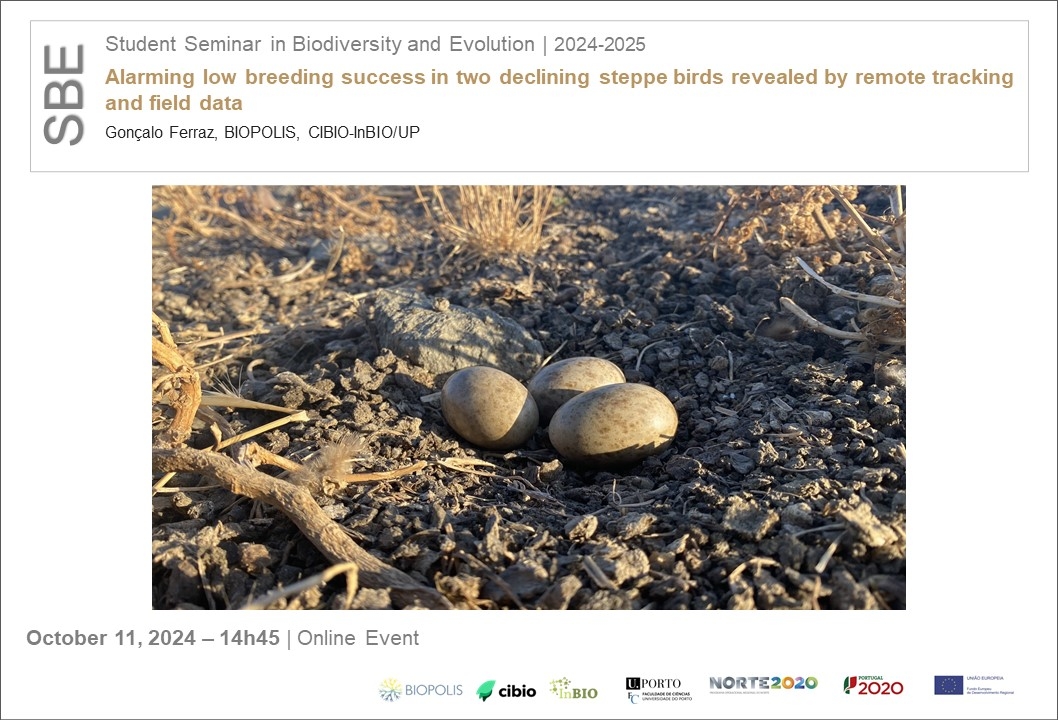Alarming low breeding success in two declining steppe birds revealed by remote tracking and field data
11 Oct 2024 - Gonçalo Ferraz, BIOPOLIS, CIBIO-InBIO/UP | 14h45 | ONLINE

STUDENT SEMINAR IN BIODIVERSITY AND EVOLUTION
[Host: João Paulo Silva, Ecological Monitoring and Conservation - TRACE]
The Iberian Peninsula is an important European stronghold for steppe birds. These species are particularly vulnerable to habitat changes primarily caused by agricultural intensification and industrial land conversion. Despite alarming population declines, key demographic parameters, such as productivity, remain unknown for most species. Assessing reproductive success and the main causes of breeding failure is crucial for understanding these declines. Many species, like sandgrouses, are not only elusive and difficult to survey but also ground nesting and vulnerable to predation and nest destruction during farming activities. Here, we used remote tracking (GPS and accelerometer) and field data to study the reproductive biology of the black-bellied (Pterocles orientalis) and pin-tailed sandgrouse (Pterocles alchata) in the Iberian Peninsula.
Combining remote nest detection with fieldwork, we monitored the breeding of both species for three years (2021-2023) in two populations of south-central Iberia, enhancing our understanding of their breeding success and the variables influencing it. We remotely monitored 76 P. orientalis and 56 P. alchata breeding attempts and conducted fieldwork to check nest contents, causes of breeding failure and assess productivity. We found very low hatching success for both species (35% for P. orientalis and 28% for P. alchata), with most nests failing due to predation. Sandgrouse have an extended (6-month-long) breeding season in response to high failure rates, producing around 3 clutches per year. Overall, high nest failure and very low productivity (<0.5 chicks per pair per year) emphasize the need for effective conservation strategies to enhance productivity and halt sandgrouse population declines.
Gonçalo Ferraz is a biologist and BIODIV PhD student in the TRACE research group at BIOPOLIS/CIBIO-InBIO. His primary research interests centre on the processes that shape species ecology, evolution, and population dynamics. During his MSc, conducted within the ECOGEN research group, Gonçalo explored the genetic drivers potentially linked to the unique phenotypes of the Angolan Giant Sable (Hippotragus niger variani). For his PhD, he shifted his focus to the ecology and population dynamics of two steppe bird species that have undergone significant population declines in recent decades: the black-bellied sandgrouse (Pterocles orientalis) and the pin-tailed sandgrouse (Pterocles alchata). By examining different but complementary aspects of both species’ biology in the Iberian Peninsula—such as movement and niche ecology or reproductive success—Gonçalo aims to understand how these species adapt to a changing environment, increasingly impacted by climate change, agricultural intensification, and, more recently, land use changes to accommodate renewable energy infrastructures. Ultimately, Gonçalo's research integrates the TRACE research group's efforts to better understand the ecology of Iberian steppe species and outline effective conservation measures to halt their decline.
[Host: João Paulo Silva, Ecological Monitoring and Conservation - TRACE]